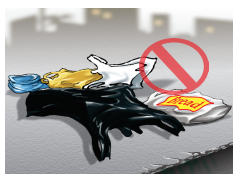Nigeria needs to produce less plastic bags, and many more uses for them
It is doubtful if many Nigerians are aware that today is the International Plastic Bag Free Day and if they do, whether they understand its significance. Celebrated on 3rd July every year, the idea is to eliminate the use of plastic bags which “may seem like a grocery shopping convenience but are also a huge strain on the environment.” An organisation, known as the ‘Bag Free World’ birthed the idea in 2010 by introducing several campaigns to promote a plastic-free world and this triggered its implementation in several countries. The theme for this year is to promote reusable alternatives to plastics.
Interestingly, Rwanda, Gambia, Morocco, Ghana, South Africa, Congo and Kenya.are among countries in Africa that already have policies prohibiting single-use plastic bags. In 2019, the federal government tried to institute a law to ban single-use plastic bags in Nigeria. The Plastic Bags Prohibition Bill was conceived to prohibit the manufacture and importation of all plastic bags used for commercial and household packaging. Even though the House of Representatives passed the bill, it stalled in the Senate. Yet, according to the Nigerian Maritime Administration and Safety Agency (NIMASA), Nigeria is among the 20 countries generating more than 80 per cent of the land-based plastic wastes that end up in the ocean.
Scientists have determined that plastics are harmful to the environment, not only because they are produced from non-renewable resources, but also because of the difficulties of disposal, since they do not decompose. Plastic is a material made to last forever, and research has shown that when disposed, they merely break down into smaller pieces and can remain in the environment for up to 2,000 years and longer. Meanwhile, respiratory issues are increasing because of air pollution from burning plastic, animal lifespans are shortened because of consuming plastic, littered plastic is clogging drains and causing floods, and unmanaged plastic is contaminating our precious oceans and waterways.
However, many countries have found ways to recycle plastics, and some even use it for road construction. In some of these countries, local communities pursue the use of recycled plastic as filler for cement blocks, ropes, and household goods such as baskets and mats. At a larger scale, manufacturers are using recycled plastic and textiles to make clothing and furniture. By using waste materials for products with monetary value such as clothing, shoes, or road construction, society is incentivised to collect plastic and capture its full value.
To recycle plastics, they are first sorted, shredded, and rid of impurities like paper. The shreds are then melted and formed into pellets, which can be made into other products. Some companies are known to recycle polyethylene into outdoor decking material, fencing, and doors and windows. Plastic bottles can be recycled into t-shirts, sweaters, fleece jackets, insulation for jackets and sleeping bags, carpeting and more bottles. Something needs to be done to reverse the growing dependence on plastics, because, according to Ellen & MacArthur Foundation, there will be more plastic in the oceans than fish by 2050 if nothing is done.
Environmentalists believe there are many ways to curb plastic waste, and these are by producing less, consuming less, and better managing existing waste to prevent contamination or leakage. They agree that solutions may vary, but that increased awareness, and improved design and disposal processes, among others, are critical to changing behaviour and better managing plastic waste. Also, there are alternatives such as cotton/Jute bags, paper bags, which are biodegradable and are made from renewable resources, and metal/paper straws. As we join the rest of the world to mark the 2023 the International Plastic Bag Free Day, the authorities have to do more in addressing a problem that impacts negatively on our world.



